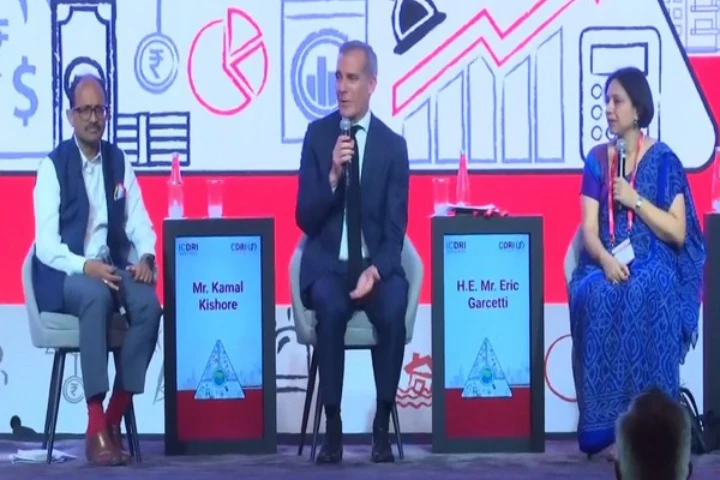

International Conference on Disaster Resilient Infrastructure in New Delhi on Thursday (Photo: ANI)
US ambassador Eric Garcetti on Thursday emphasised the urgent need for proactive disaster mitigation strategies and also underscored the importance of financing in disaster resilience.
He also expressed concern that while progress has been made, there remains room for improvement in aligning global and national financing priorities to adequately address disaster risk.
In an interactive session at the International Conference on Disaster Resilient Infrastructure in Delhi, US Ambassador Garcetti and Kamal Kishore, Member and HoD of the National Disaster Management Authority (NDMA) of India, shared insights on disaster mitigation strategies and collaboration between nations.
Ambassador Garcetti highlighted the importance of balancing financing for both pre-disaster mitigation efforts and post-disaster relief. He emphasised the need for quicker dissemination of ideas and resources, advocating for a bottom-up approach that empowers local communities in rebuilding efforts. Referring to the COVID-19 pandemic, he stressed the importance of learning from communities and swiftly sharing information across borders.
“We at the international, national level have to be much quicker at sharing ideas,” Ambassador Garcetti stated. “And at the local level, I think we have to invert ourselves, too, to empowering ourselves to realise we will be the ones who rebuild.”
While Kamal Kishore echoed the need for transparent communication and collaboration between government institutions and the public. He emphasised the importance of sharing information in a language that is understandable and actionable, citing examples from recent disasters in India.
“Some of us who work on disaster risk management, we have to really get out of the jargons and get better at communicating,” said Kishore.
Both speakers also highlighted the deepening cooperation between the United States and India in disaster resilience efforts. Ambassador Garcetti praised the bilateral relationship, emphasising initiatives such as the CDRI (Coalition for Disaster Resilient Infrastructure) and the TriDep program, which aims to provide training and support to third countries.
“It’s the trilateral, quadrilateral level where, for instance, the trilateral development cooperation that we’re doing… it’s really about changing the international approach to climate disaster preparedness,” Garcetti explained.
The dialogue between Ambassador Garcetti and Kamal Kishore underscored the importance of international collaboration and community-driven approaches in building disaster-resilient infrastructure.
The Indian Pharmaceutical Alliance (IPA) on Thursday welcomed the exclusion of pharmaceuticals from US tariffs,…
According to the new U.S. trade policy announced by President Donald Trump on Wednesday, the…
External Affairs Minister S Jaishankar on Thursday thanked Maris Sangiampongsa, Minister of Foreign Affairs of…
Prime Minister Narendra Modi departed for Bangkok, Thailand, on Thursday morning to attend the 6th…
Anthony Agotha, Ambassador at Large-Special Envoy for Climate and Environment, European External Action Service, highlighted…
The Government of Myanmar has expressed deep gratitude for India's swift and substantial support in…